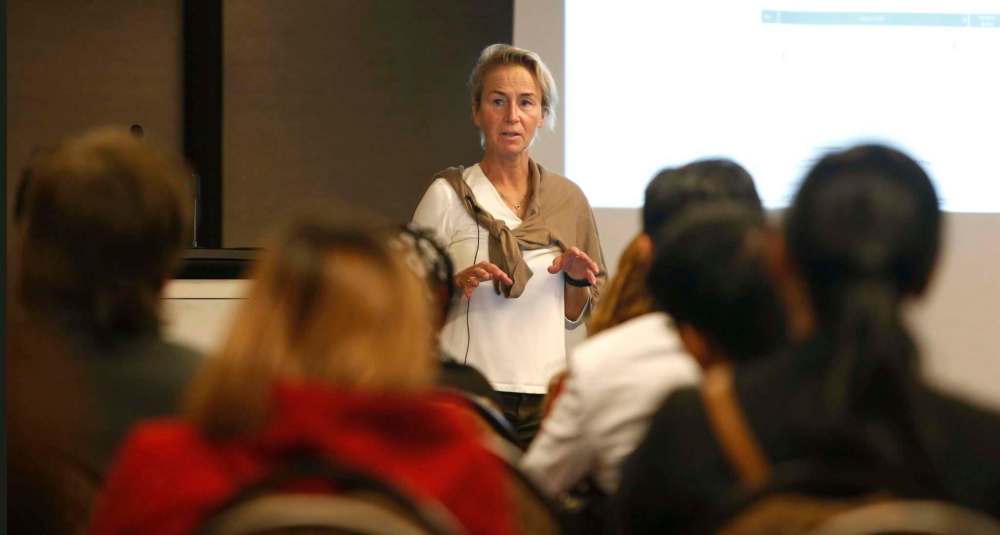Speech therapist helps newcomers mask accents
Advertisement
Read this article for free:
or
Already have an account? Log in here »
To continue reading, please subscribe:
Monthly Digital Subscription
$19 $0 for the first 4 weeks*
- Enjoy unlimited reading on winnipegfreepress.com
- Read the E-Edition, our digital replica newspaper
- Access News Break, our award-winning app
- Play interactive puzzles
*No charge for 4 weeks then billed as $19 every four weeks (new subscribers and qualified returning subscribers only). Cancel anytime.
Read unlimited articles for free today:
or
Already have an account? Log in here »
Hey there, time traveller!
This article was published 23/05/2017 (2528 days ago), so information in it may no longer be current.
Try to sound more Canadian, eh?
For many immigrants trying to get ahead, that’s the ticket, says a Winnipeg speech therapist who helps clients modify their accents.
“The most typical client I have coming to see me is a very intelligent, professional immigrant that finds it so difficult to feel at par with work colleagues and only because of their accent,” said Luella Jonk, a registered speech language pathologist and certified professional counsellor.
“They want to work their way up the ladder, but sometimes they feel they’re not, perhaps, appreciated for their work that’s at the same level,” said Jonk, who presented an “accent reduction workshop” Wednesday at the Career, Education & Settlement Immigrant Fair in downtown Winnipeg. The one-day event was sponsored by Canadian Immigrant magazine and included motivational speakers, workshops, a trade show with exhibitors and potential employers.
“When you’re asked to repeat something more than once in a meeting, you can see how that would affect your sense of self-worth or self-esteem — ‘What can I do about this? What can I do to make myself better understood?’ ”
For Jonk, her work is close to her heart.
“My father was an immigrant from the Netherlands. He always had a very strong accent.” She loved his Dutch accent and said he was a very successful farmer who never tried to change it. That’s not an option for many newcomers today, however.
“I see hardworking immigrants coming to this country and wanting to improve themselves and be the best they can,” she said. That includes improving their spoken English.
A common problem involves the “voiceless” th sound — as in thank you — versus the th sound in brother, where the tongue is placed between the teeth, Jonk said. Mispronunciations such as “tank you” and “over dere” can impact a listener’s perception of the person speaking, she said.
“You come across as maybe not sounding quite as intelligent. It’s unfortunate that an accent can change a listener’s perception of someone when intelligence has nothing to do with accents,” said Jonk.
Some of her clients are corporations that fund their employees getting accent modification training on their own time.
“They see their potential,” said Jonk, who created Speak, Read, & Spell, an online learning platform and book series. About 80 per cent of her speech therapy work is one-on-one and she sees many of her busy clients via Skype.
“In everyday life, we’re all running around like crazy,” said Jonk.
Taking on the added work of improving their spoken English shows a determination to fit in and be understood, she said.
“That’s why I admire accented speakers — they’ll take customer service jobs because they want to practise.”
But, as a consequence, they’re leaving themselves open to an impatient and sometimes rude public and “complete degradation,” Jonk said. People working at call centres will often be told, “I want to talk to someone who speaks English,” she added.

While many Canadians lack patience because they don’t understand what it’s like being a linguistic minority, she’s seeing a growing accent acceptance locally.
“I think Winnipeg is getting a bit better,” Jonk said. Winnipeggers are often kind to a fault — they won’t say that they don’t understand what someone has said or correct their pronunciation.
“We’re much too polite,” Jonk said.
But it’s better to seek clarity than pretend you know what someone is saying when you don’t, she said.
“Instead of nodding, say ‘Could you repeat that?’ or ‘I didn’t quite get that.’ ”
She gave an example of a client who wanted help pronouncing a word after he “kind of got that weird look” from colleagues when he said it. He was telling people about an outing in Pinawa, but he had mispronounced it “pi-NOW-wa.” People smiled and said, “That must have been fun,” but no one knew what he was talking about, Jonk said.
“They were much too polite.”
Jonk said her clients and students would appreciate being discreetly and kindly corrected. “They’re the best students to have. They give so much back to you — their joy, their motivation is incredible.”
carol.sanders@freepress.mb.ca

Carol Sanders
Legislature reporter
After 20 years of reporting on the growing diversity of people calling Manitoba home, Carol moved to the legislature bureau in early 2020.


